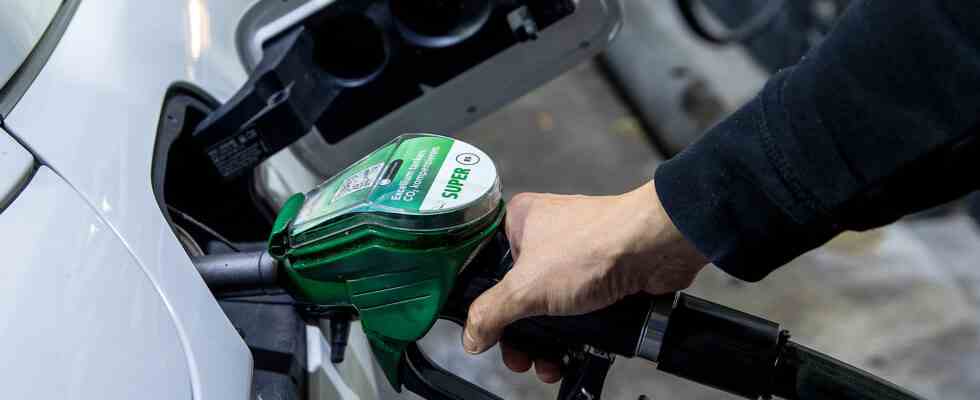Status: 20.06.2022 2:20 p.m
Around three weeks after the introduction of the tank discount, diesel costs more than before the tax cut. Super E10, on the other hand, has become cheaper recently. However, clear price signals are coming from the crude oil market.
Motorists have to pay more for diesel fuel again than before the introduction of the tank discount on June 1st. At 2.054 euros per liter in the nationwide daily average yesterday, the price exceeded the value of May 31 of this year, when a liter cost 2.044 euros. The ADAC announced this on request today. The tax rebate of 16.7 cents per liter has now been completely consumed by the price increase.
Diesel had already reached the mark of May 31st last Friday and exceeded it again for the first time on Saturday, as has now been announced. Super E10 cost 1.913 euros per liter on Sunday. Unlike diesel, petrol has become cheaper in recent days.
Super E10 cheaper by 23.8 cents
The tax relief that applies from June to August is intended to relieve consumers in view of the high fuel prices. Including VAT, it’s about 35.2 cents for premium petrol and 16.7 cents for diesel. However, the prices never fell to this full extent after the discount came into effect. Yesterday, Super E10 was 23.8 cents cheaper than the day before the tax cut, which, according to calculations by the federal government, will result in a loss of revenue of 3.15 billion euros.
The tax cut is still under criticism. Recently there have also been allegations that a large part of the measure will not benefit motorists but the oil industry. “The tax cut ends up for the most part with the mineral oil companies and doesn’t get enough with the drivers,” said the ADAC, for example. The head of the German Institute for Economic Research (DIW), Marcel Fratzscher, also declared it a failure with reference to the deadweight effects of the oil companies.
Debate on oil company profits
After a comparison with the prices in France, the Munich ifo Institute came to the conclusion that the discount for diesel was passed on to customers in full and for petrol to a large extent. In the case of diesel, the gas stations would have passed on 100 percent of the temporary tax reduction of 17 cents per liter. In the case of Super, it was 85 percent of the tax rate reduced by 35 cents.
The mineral oil industry referred to increased purchase prices and costs. According to Minister Christian Lindner, the Ministry of Finance also has no official knowledge of unusually high profits made by energy companies from the controversial tank discount. “We can’t say that at the moment,” the FDP leader recently told the “Welt”. “Here in the Federal Ministry of Finance, we have no official knowledge that the domestic mineral oil companies have particularly high profit margins.”
The Federal Cartel Office is therefore currently examining the development of fuel prices. However, the authority has repeatedly pointed out that it cannot ban high prices per se. Federal Minister of Economics Robert Habeck (Greens) now wants to tighten antitrust law and give the competition authorities more opportunities to intervene. Ultimately, the Cartel Office should also be able to break up companies if they have too much market power, and also skim off profits more easily.
Oil prices fall
After the start of the Ukraine war, fuel prices in Germany had risen to unprecedented heights. According to ADAC data, diesel reached its previous maximum on March 10 with 2.321 euros per liter on a nationwide daily average and E10 with 2.203 euros on March 14. In April, both fuels were then temporarily below two euros again, before a new upward trend began, which was only briefly stopped by the tax cut at the beginning of the month.
In view of the high fuel prices, the automobile club advises motorists to keep an eye on the sometimes large price fluctuations at the gas stations within a day. Petrol and diesel are particularly expensive, especially in the mornings. The price peak is usually in the morning after 7 a.m., according to an analysis by the ADAC. The cheapest time to refuel is between 8 p.m. and 10 p.m. The difference between the high in the morning and the low in the evening is a good 16 cents for diesel and ten cents for Super E10.
However, developments on the oil market are raising hopes that prices could fall somewhat. A barrel (159 liters) of North Sea Brent cost 112.61 US dollars in midday trading today, 49 cents less than on Friday. The price of a barrel of West Texas Intermediate (WTI) was down 18 cents to $109.38. Oil prices were already under pressure on Friday.
“The sharp fall in prices on Friday is to be seen as a belated reaction to the recession concerns that have been weighing on the prices of other commodities for some time,” explained commodities expert Carsten Fritsch from Commerzbank.

